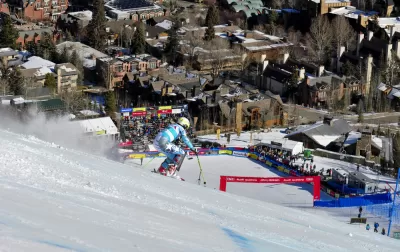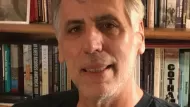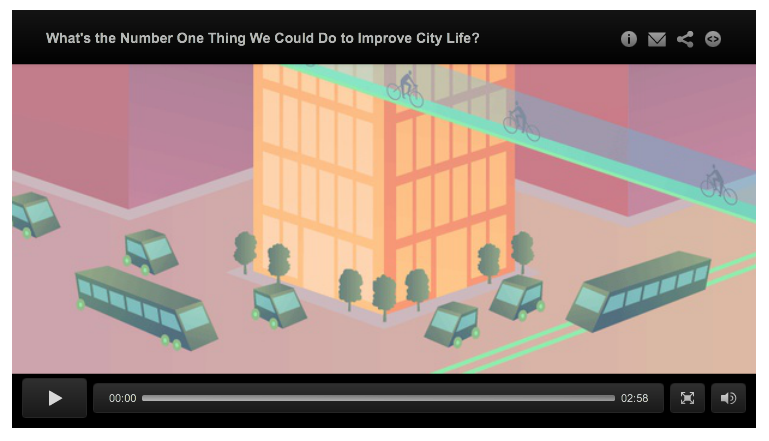The Aspen Ideas Festival didn't offer much that was particularly compelling, but it had its moments.

The Aspen Idea Festival's 2014 edition offered nothing that we haven’t heard before, if the short video featured in this recent CityLab story is any indication. Several "Leading Voices" in today's conversation about cities were asked this "Big Question": What’s the Number One Thing We Could Do to Improve City Life?
Geoffrey West says it's time to recognize the prominence of cities and urban life in the future of the planet. Alissa Walker says we need to make cities more walkable. Jeff Speck says we need to "restripe" cities to make them more "equitable" for cars and pedestrians. Jennifer Pahlka says we need to get cars out of cities altogether and develop better mass transit. M. Sanjayan says we need better ways to connect city-dwellers back to nature.
None of this is all that inspiring on the face of it. One persistent commentator spares no snark in offering this assessment:
I don't care what self-entitled, privileged people who go to events like TED or Aspen Institute think. They are not more important or interesting because they are there…Oh, and Mr. Sanjayan, it's called houseplants. People who live in cities actually grow plants in their houses on windowsills, tables and in windowboxes. How about that? Some even have yards where they live…The ONE thing that is needed is affordable housing for every class of people in their neighborhoods or where they need to live. That is more important than free bicycles, gardens, parks, or anything else.
The last point about affordable housing is a recommendation that's more compelling than any offered by the Leading Voices featured in the video. However, embedded in the video are a few excellent observations that might generate more creative thought about what’s needed for urban improvement beyond what we’re already investing in the area of transportation. These observations might also allow us to better address our commentator's (and this blog's) expressed concern for social and cultural equity.
Luís Bettencourt argues that cities "enable the mixing of people and organizations, interactions that can be generative of new things, of better things." How might public space (including urban parks) and housing (including housing for the homeless) be better designed and located so as to encourage such fruitful mixing across lines of class and culture?
Geoffrey West says we need to "engage citizens" and help them "understand what it is we’re trying to accomplish." Leveraging modern technology is one way to engage citizens. But there’s certainly much more that can be done to further the collective enterprise of city building via more prosaic technologies like sticky notes, white boards, and billboards.
Finally—and perhaps most significantly—M. Sanjayan notes that "we lived on the plains of East Africa for millions of years" before we became "city worthy." What would an agenda for improving city life look like if we checked our presentism and took the deep, pre-urban history of humankind a bit more seriously as a source of ideas? And, if we considered the lessons taught by urban phenomena with which scholars and planners are much less familiar? Such comparative exercises might expand and enrich our understanding of city life and the variety of ways that humans have dealt with its many challenges.

Planetizen Federal Action Tracker
A weekly monitor of how Trump’s orders and actions are impacting planners and planning in America.

Maui's Vacation Rental Debate Turns Ugly
Verbal attacks, misinformation campaigns and fistfights plague a high-stakes debate to convert thousands of vacation rentals into long-term housing.

San Francisco Suspends Traffic Calming Amidst Record Deaths
Citing “a challenging fiscal landscape,” the city will cease the program on the heels of 42 traffic deaths, including 24 pedestrians.

Defunct Pittsburgh Power Plant to Become Residential Tower
A decommissioned steam heat plant will be redeveloped into almost 100 affordable housing units.

Trump Prompts Restructuring of Transportation Research Board in “Unprecedented Overreach”
The TRB has eliminated more than half of its committees including those focused on climate, equity, and cities.

Amtrak Rolls Out New Orleans to Alabama “Mardi Gras” Train
The new service will operate morning and evening departures between Mobile and New Orleans.
Urban Design for Planners 1: Software Tools
This six-course series explores essential urban design concepts using open source software and equips planners with the tools they need to participate fully in the urban design process.
Planning for Universal Design
Learn the tools for implementing Universal Design in planning regulations.
Heyer Gruel & Associates PA
JM Goldson LLC
Custer County Colorado
City of Camden Redevelopment Agency
City of Astoria
Transportation Research & Education Center (TREC) at Portland State University
Jefferson Parish Government
Camden Redevelopment Agency
City of Claremont




























